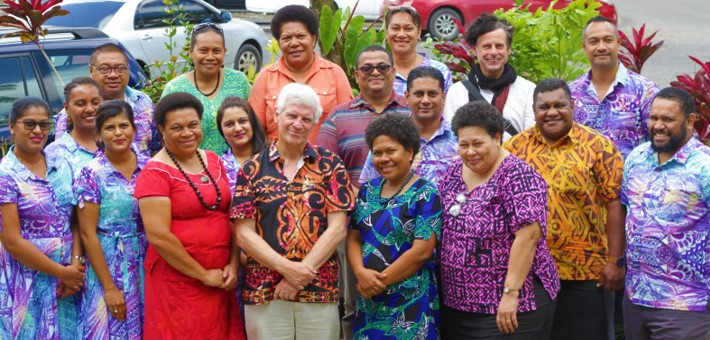
A two-day workshop on E-Moderation was organised by the Centre for Learning & Teaching Enhancement (CLTE) in conjunction with the Commonwealth of Learning (COL) at the Derrick Samabula Campus from the 30th to the 31st of October, 2019. Participants were from the School of Public Health & Primary Care(SPHPC) at CMNHS, the Schools of Communication, Language & Literature (SCLL) and Education (SOE) at CHE, and the Centres for Flexible & E-Learning (CFEL) and Learning & Teaching Enhancement. The workshop focused on key areas of E-Moderation related to facilitating Blended or Online courses such as Models of E-Moderation, Building Online Communities, Communication Channels, Skills/Competencies of the Online Moderator and Getting the Mix Right in Blended learning. Participants that attended were fairly new to the Blended development and delivery of their courses. The delivery of the workshop modelled the content of the workshop in a Blended format where participants engaged in face to face classroom discussions and used the online tools in Moodle.
Facilitator for the workshop, Michael Coghlan, was happy to engage with the participants in terms of connecting their contextual experiences teaching their disciplines with the workshop content. Michael has been working as a creator, facilitator and thinker around e-learning environments since 1997. He was co-founder of the Webheads online community and currently works as an e-learning facilitator for the adult vocational and training sector in Australia, and as an independent e-learning consultant. He has facilitated several State and national e-learning projects and is a member of the Australian Horizon Report advisory board. He was also invited to join a group of 100 educators for a Global Education Retreat in Austin, Texas sponsored by the New Media Consortium to discuss the impact of technology on education. “The term ‘e-moderating’ is used to capture the wide variety of roles and skills that the online teacher, lecturer or trainer needs to acquire (Salmon, 2004). Online human supporters have a wider range of expertise compared to working with face-to-face learning groups. The role of the lecturer or teacher in all educational contexts needs to change to include e-moderating to realise the development and potential of new online environments…”
In his opening address, Pro Vice Chancellor for Learning & Teaching, Professor James Pounder reinforced the need for proper online facilitation – how to create a proper learning environment and engage with people online. Teams at the Centres for Flexible & E-Learning and Learning & Teaching Enhancement hope to develop and deliver further E-Moderation workshops to the Colleges and more teaching staff members in the new year.
Dr Deepak Prasad, Associate Dean Learning and Teaching Enhancement, thanked COL for the continued support and encouraged participants to use technology to create flexibility in the teaching process. He emphasised that “teachers need to experiment using different facilitation techniques to engage learners in active learning opportunities so that they develop deeper understanding of the material being covered rather than mere recall and repetition of information.”
